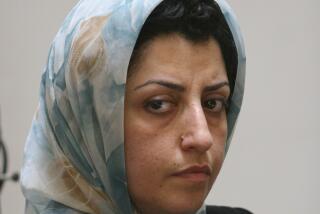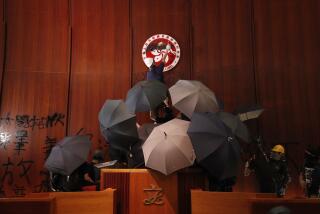Egyptian activist, 23 others get 15 years in jail for political dissent

- Share via
Reporting from Cairo — A criminal court on Wednesday handed down a 15-year jail term for a leading figure in the 2011 uprising against Hosni Mubarak in connection with a protest last year against the military-backed government. It was the first such verdict under new Egyptian President Abdel Fattah Sisi.
The heavy jail term for activist Alaa Abdel Fattah and his 23 co-defendants appeared to bode ill for any easing of a wide-ranging crackdown on political dissent that has taken place over the last 11 months in Egypt. The sentences were the longest yet for liberal pro-democracy activists targeted in recent months.
Meanwhile, Sisi took the unusual step of making a hospital visit Wednesday to a woman who was sexually attacked by a mob during celebrations of his election victory, with her ordeal captured on a widely shared video. The government has come under strong criticism from activists for failing to stem widespread sex harassment in public areas.
“Our honor is being assaulted in the streets,” the presidential office quoted Sisi as saying. “This is unacceptable, and we can’t allow one more incident like this.”
In the case against the activists, the defendants were fined nearly $14,000 each in addition to their 15-year sentences, marking the latest mass verdict by an Egyptian court. International rights groups and legal advocacy organizations have said any semblance of due process is unlikely to occur in tribunals involving dozens or even hundreds of defendants at once.
Because they were convicted in absentia, the defendants can seek a retrial, lawyers said, but the verdict will stand in the meantime.
During the Tahrir Square uprising more than three years ago, Alaa Abdel Fattah, now 32, became internationally known as one of the young and social-media savvy faces of the pro-democracy movement. He comes from a family of prominent activists; his father is a distinguished human rights lawyer jailed under Mubarak, and his aunt is the novelist Adhaf Soueif, whose works have been translated into many languages. His wife and sister are also well-known activists.
Abdel Fattah had been freed in March after being held for nearly four months. He was rearrested after Wednesday’s sentencing, for which he was not allowed into the courtroom.
The defendants in this case were among the first to be prosecuted under a law enacted in November by the interim government, which criminalized street protests unless sanctioned by the government. Other charges levied against Abdel Fattah included assaulting a police officer. His backers say video evidence does not support that claim.
Sisi took office Sunday with pledges of political inclusiveness for all but those who advocate or commit violence. The interim administration that assumed power last July -- with Sisi, as defense minister, serving as Egypt’s de facto leader -- jailed thousands of opponents in the Muslim Brotherhood of the toppled Islamist President Mohamed Morsi, together with much smaller numbers of secular activists.
Egyptian authorities say there are no political prisoners in the country, a claim greeted with incredulity by rights groups. This week, Human Rights Watch and Amnesty International declared that Sisi, elected in a landslide vote last month, was taking office amid “a human rights crisis as dire as any period in the country’s modern history” and urged him to implement swift reforms.
The rights groups cited ongoing abuses including use of excessive force by police and soldiers, mass arrests and torture, and sharply curtailed freedom of speech and assembly.
Special correspondent Amro Hassan contributed to this report.Follow @laurakingLAT for breaking news out of North Africa and the Middle East.
More to Read
Sign up for Essential California
The most important California stories and recommendations in your inbox every morning.
You may occasionally receive promotional content from the Los Angeles Times.










